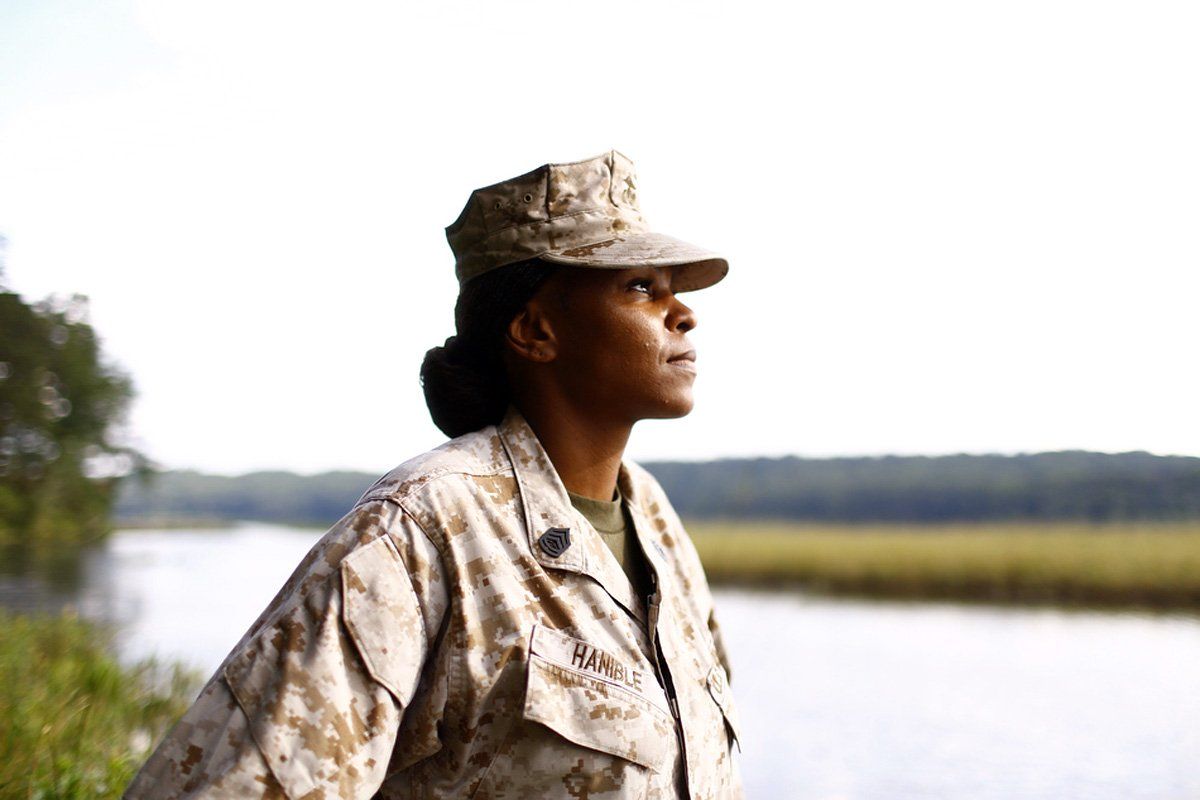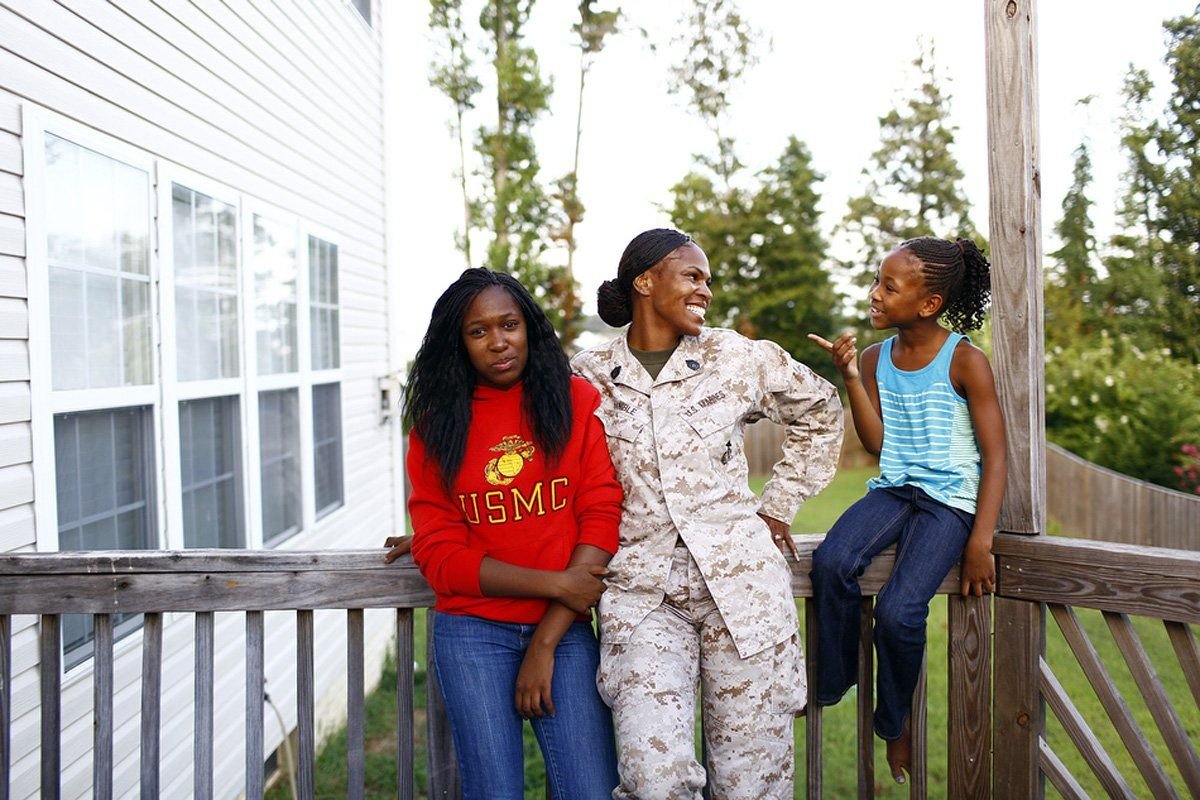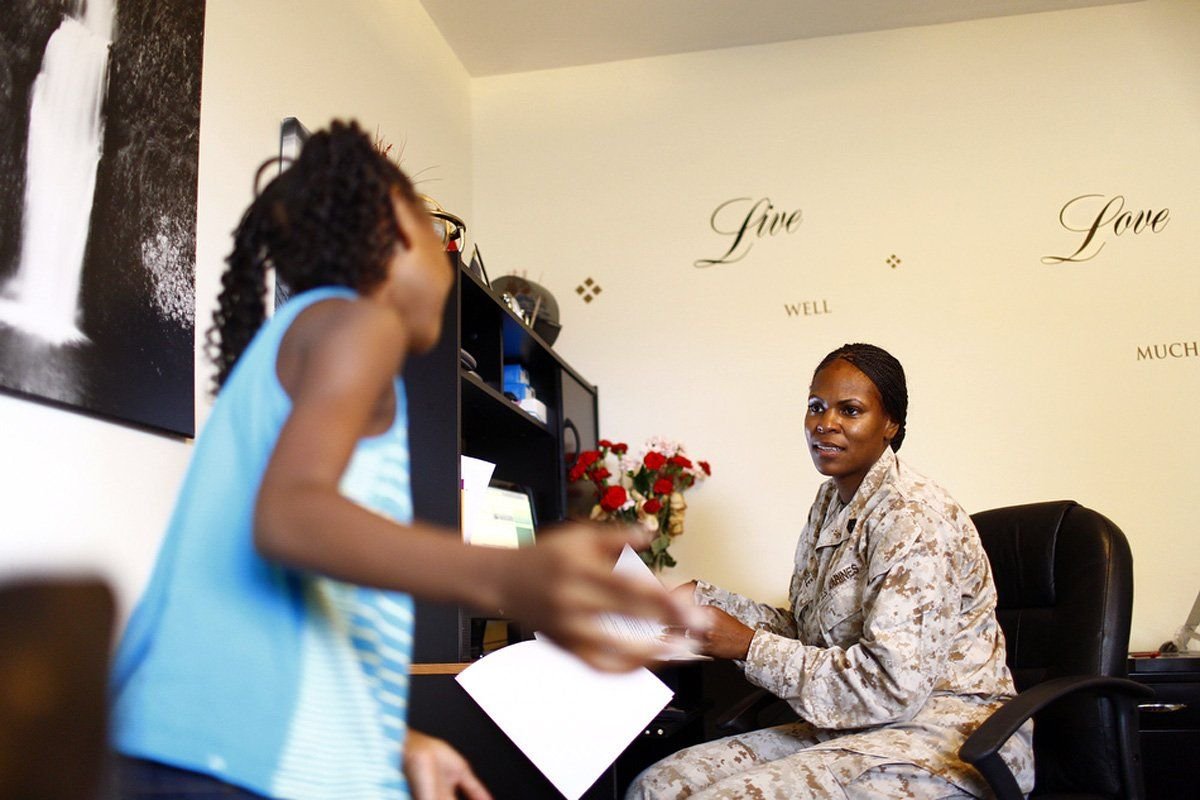
You're not Marine Corps material—you won't make it."
That was Tawanda Hanible's brother, Lindell, running down the sister who had always shown him up in school. Lindell was two years older and already a Marine. He told "Tee," as she was called, "you're too girly." He forgot that she was also stubborn as a fence post.
The odds had been against Tee from birth. Her biological father was shot and killed when she was an infant. She was raised in a strict foster home on Chicago's deep South Side. Minnie Hudson, who later adopted her and her brother, had four children of her own. Anywhere from two to 20 foster children rotated through Hudson's three-bedroom apartment, sleeping three in a room or on a couch or floor.
At 15, Tee turned rebellious. Drugs had saturated the South Side like a plague. Crime went rampant. Drive-by shootings picked off some of her friends. Tee lost her way. "Poor grades, wrong crowd," was the rap on this once-star student.
When word surfaced that her best friend was going to be jumped, Tee's teenage rebellion found a cause. She smashed the glass on a fire alarm. "Run, take the side exit!" she shouted. The girl escaped a beating. For this tiny act of personal heroism, Tee was thrown out of school.
Hudson, the only mom she knew, and dearly loved, was now in her 70s and sapped by a stroke. Too weak to reverse the backsliding of the brightest and most talented of all her children, Hudson sent the girl off to a paramilitary reform school in rural Illinois. Lincoln's Challenge, run by the National Guard, gave Tee the structure and discipline she craved. She graduated with a scholarship for college.
"The change in her was remarkable," recalls her sister Nicole. "She apologized for all the pain and trouble she had put me and her mother through. That program transformed her whole trajectory in life."
At a military recruiting center, she was lassoed by a Marine who gave her an aptitude test. Males needed a 31 score to pass; females needed 50; Tee scored 60. Few survivors of boot camp would call it "fun," but Tee drew the attention she wanted by becoming the company clown and playing simulated war games against the guys. She was thrilled to be chosen to join the first small class of females permitted to take the same Marine combat-training course as the men. This was 1997, and news crews were all over the story. Being exceptionally tall, Tee was stuck with the heaviest weapon, the SAW, a portable machine gun capable of heavy firepower. "Every time we humped on 10mile hikes, I carried the SAW," she says. "I was just happy to make it through."
After training at Camp Pendleton in California, Tee was assigned to a desk job as an administrator. She fell in love, became pregnant, and made a hasty first marriage.

Everything changed for her on Sept. 11, 2001. Tee and her fellow Marines sat immobilized before a TV as they watched a plane attack the Pentagon. Marines are trained to spring into action at the first word of emergency. Tee developed a nagging sense of irrelevance. A year later, she saw her chance to fight. "When we got word that we were gearing up to go into Iraq, I wanted to be part of defending our country," she says, her vehemence undiminished as she recalls September 2002. Her job was to write the orders to fill the billets for Marines being sent overseas. She set her mind on being one of the Marines sent into action, whatever it took. When she spotted an opening for an administrative chief, she plugged in her own name.
Her boss called her in and tried for half an hour to discourage her. "Are you sure you want to go to Iraq?" probed Ronnie McPhatter, a chief warrant officer. "You have a child, and you gotta remember, this will be war."
"I just feel an urge. I need to go," she told him.
He reminded her that she was a single mother. This would mean leaving her 3-year-old child, and there was no guarantee she would make it back.
"I want to go, regardless of your thoughts on it," she said, stubborn to the core. McPhatter saw that as an advantage.
It is a rare woman, especially a single mother, who would choose to go to war over staying home to nurture her preschool child. But Tee needed to prove herself worthy, in God's eyes, for the second chance she had been given. The selflessness of her adoptive mother was her model. "I did not wrestle with myself about it," she says. Tee's call home assumed a ready acceptance by Minnie Hudson to take over as her child's surrogate mother.
"Mom, I may be deployed soon."
"What will you do with Destiny?"
"I guess she'll be coming home to you."
"OK." It seemed as simple as that. The emotional wrench began after Tee put her daughter on a plane for Chicago, accompanied by a fellow Marine. She had to wait around three months in California for the orders to ship out. Missing Thanksgiving with her child, missing Christmas with her child, not seeing her face when Destiny opened presents on her 4th birthday, and having only a snatch of conversation now and then on three-minute "morale calls" home were a small taste of the sacrifices that she and all her fellow warriors would make in Iraq.
"I didn't know what I was getting into," Tee can admit now. "The emotional side of it was the worst. But I don't regret my decision."

Gunnery SGt. Hanible, as she was ranked, was the first woman with one of the first units to land in Kuwait to prepare for the invasion of Iraq. It was early January 2003, and snow dusted the desert. Tee was not prepared for the bitter cold or Spartan conditions. The first tasks were to assemble a tent, secure it with sandbags, and set out cots four feet apart. There would be more than two dozen Marines sleeping together. All men, with a single exception.
"What do we want to do with the female?" That was the awkward discussion the first night, recalls Tee's boss, muscle-bound Master Gunnery Sgt. Evertan Manhertz. "Does she go in a separate tent?"
Tee put her foot down. "I'm a Marine. I don't want to be in a separate tent."
She was a strikingly pretty 22-year-old woman surrounded by strapping young men ages 18 to 24, all away from home and probably all pretending not to be scared. She might well have been a target of sexual assault. Her other boss, Master Gunnery Sgt. Torry Wells, set the tone.
"OK, there's 25 or 30 of us, and, yes, there's one female in the group," he announced. "But she'll be treated with respect at all times. No hanky-panky. Treat her just like you would your mother or your sister, because that's what she is— your sister, a fellow Marine."
The men gave her one of the two shower stalls. They found scrap wood to build her a dresser. The portable latrines were raunchy, so the men pawed holes in the sand to do their business. Tee took the night shift so she could walk way out in the desert after midnight and do the same. "I had 300 brothers," she says, "and they were taking care of me."
On her fell the responsibility to account for the flow of more than 1,000 Marines as they arrived over the next three months. After matching them up with the manifest, she had to outfit each of them with the weapons arriving by ship. "In all that chaos, I never got the sense that she was overwhelmed," says Manhertz, who became her mentor. "She was one of those individuals where, like a missile, you fire and forget."
"We're going in tomorrow night," came word. Tee, of course, said nothing about the invasion when she called home. "Don't worry about it," she told her sister. "I'm just handling the processing. The enemy doesn't want anything to do with me."
Nicole knew her sister was downplaying her exposure. "You're in a war. It doesn't matter where you are, you're in danger."
Tee got a good laugh when her spunky 4-year-old got her turn on the phone. "Mommy, I know you're over there fighting a war because that mean man sent you there," squeaked Destiny. "Bush, his name is Bush. He sent you over there."
"Who told you that?"
"Gramma."
After chow, Tee's team suited up with 60 pounds of gear and left base camp. She was in the first wave. Driving a Humvee into dark as black as the bottom of the sea was the tense part. She could hear distant missiles screaming across the sky. It was on. Shock and Awe. For the next six or seven hours, they drove at a crawl toward the sounds of invasion. "I wasn't scared," she recalls. "I didn't have a clue what the clear danger was, what to look for, where the enemy was."
The next seven months in Iraq were hard work under blistering heat. In 12-hour shifts, she kept track of her fellow Marines, supplied them with weapons, and accounted for those injured and killed in action. Not infrequently, her company was warned that Iraqi soldiers were coming through and they jumped into their bunkers with gas masks. The threat of chemical weapons was on everybody's mind. But what mattered most to Tee was that at last she belonged to something big.
Coming home after seven months was not as heartwarming as she had imagined. Families close up after missing a mother for too long. "Destiny was sleeping with her gramma. They had schedules all worked out," Tee says, remembering how it felt to be superfluous. After a week, she took her daughter back to Camp Pendleton. She and Destiny became close over the next few years. Tee was relieved to see "no damage was done, developmentally."
Tee had fallen in love with a handsome Marine while they were in Iraq together. Back in California, their romance blossomed into marriage, and she had another little girl, Jasmine. In 2005 she felt the call to go back to Iraq. By then, 11 female Marines were part of her unit. Some also had children. Tee's second daughter was only 9 months old. Her husband was against her deploying overseas again.
Their argument was settled when Tee earned a plum assignment as a recruiter. She and her husband were sent to Charlotte, N.C., on recruiting duty at the same time. In less than two years of working the streets, Tee brought 72 youngsters into the Marines, a dozen of them women. But while she was gaining awards, her husband was being ridiculed by men in his unit: "Why can't you get your numbers up?" His jealousy played itself out in unfaithfulness.
"Under my sister's steely exterior," says Nicole, "I could tell she was broken up by the end of that marriage." The bitter irony was that Tee's career success led to a failure in the family life she so desired.
Destiny today is a mirror image of her mother at age 14. They are as close as sisters. The family is gathering on the porch of their modern three-bedroom home near Marine headquarters at Quantico in Virginia to send off two daughters for their first day back at school. Dressed up like a girly-girl, Destiny asks her mom, "Do I look all right?"
Her irrepressible little sister, Jasmine, steals the limelight. The 8-year-old confesses that when Mom's not around, she pulls her uniform and boots out of the closet and parades in front of the mirror. "I'm going be a Marine like Mom," she says. Asked why, she has a ready answer. "To help people. And go to war, like Hunger Games." The Hollywood fantasy makes everyone laugh. But Tee is clear on this point: she would like to see Jasmine become a Marine, but not to go into combat.
The minute a man's footsteps are heard, Jasmine swoons, "Daddddddddyyyyyyy!" Both girls leap on his sides like cubs. No one would guess that Donald Hanible Jr., a retired Marine, is their stepfather. There is palpable love in this family.
"Mommy met the president!" blurts Jasmine. Tee had neglected to mention she was chosen to represent the state of Illinois at the White House Dinner for Heroes last March. With her hair finely braided and her superfit silhouette suited up in a black waistcoat, red cummerbund, formal tie, and long black skirt, she flashed a smile as broad as Michelle Obama's as their picture was taken together.
When I ask Tee, who is now 34, if she thinks of herself as a hero, she grows solemn. "I could have done more," she says, barely audible. "There must be some thing else I could do to justify why I'm
here on earth."
She found a way starting last year. The philanthropic spirit planted by her adoptive mother had first germinated when she worked as a Marine recruiter and interacted with so many kids who didn't qualify to join the corps and went back home to miserable situations. She wanted to become a mentor to them, but cruising her laptop to look for volunteering possibilities, she found none in her area. She asked her husband, "Baby, what do you think if I just started a nonprofit to connect returning veterans with at-risk kids to be their mentors?" Donald was supportive. Nicole, a senior diversity consultant, helped her to structure the organization.
Operation Heroes Connect has already fostered bonds between 36 Marine mentors and 37 kids whose families' tough times brought them to homeless shelters. The tone is set by Tee's dedication as the matchmaker.
"I don't want no mentor," snarled Christopher Williams, a wounded warrior of street life who had been expelled from school. When Tee first approached him in a local homeless shelter, the skinny 17-year-old African-American boy held her off for a week. He had already been hurt by a previous mentor who failed to show up as promised. Day after day, Tee sat with the boy in the shelter and talked to him.
"I'm not going anywhere," she insisted. "I've been down the same path you're going down." She told him that her organization, Heroes Connect, was there for a reason. "I believe it's God's doing that we're here in your life at this time, when you need somebody the most."
Christopher listened but responded only in monosyllables. Finally, he agreed to give her program a chance. He gave Tee a hug. She paired him up with an active-duty Marine staff sergeant, Brian Gardner, who was recently back from fighting in Afghanistan. Tee knew that, like herself, the Marine needed a new, challenging sense of purpose. Gardner was on the all-Marine basketball team. For their first outing he took Christopher to a ball game.
When the boy opened up, Gardner drove him with his mother to an alternative school in Virginia Beach where he earned his GED in six months. Gardner visited him on weekends and showed up for his graduation two weeks ago.
"Now Christopher is getting ready to go into the Army," Tee says with unabashed pride. She is already hatching plans for when she is retired in another few years. "I want to build Heroes Connect into a national organization and eventually take it global."
Her siblings stand in awe. "She's a hero because the odds have been against her for her entire life," says her sister. "A lesser person would have succumbed." Her brother admits he was dead wrong. "I didn't think she'd make it as a Marine. She always goes above and beyond to help other people. That's what separates her from the rest."
Uncommon Knowledge
Newsweek is committed to challenging conventional wisdom and finding connections in the search for common ground.
Newsweek is committed to challenging conventional wisdom and finding connections in the search for common ground.
About the writer
To read how Newsweek uses AI as a newsroom tool, Click here.








